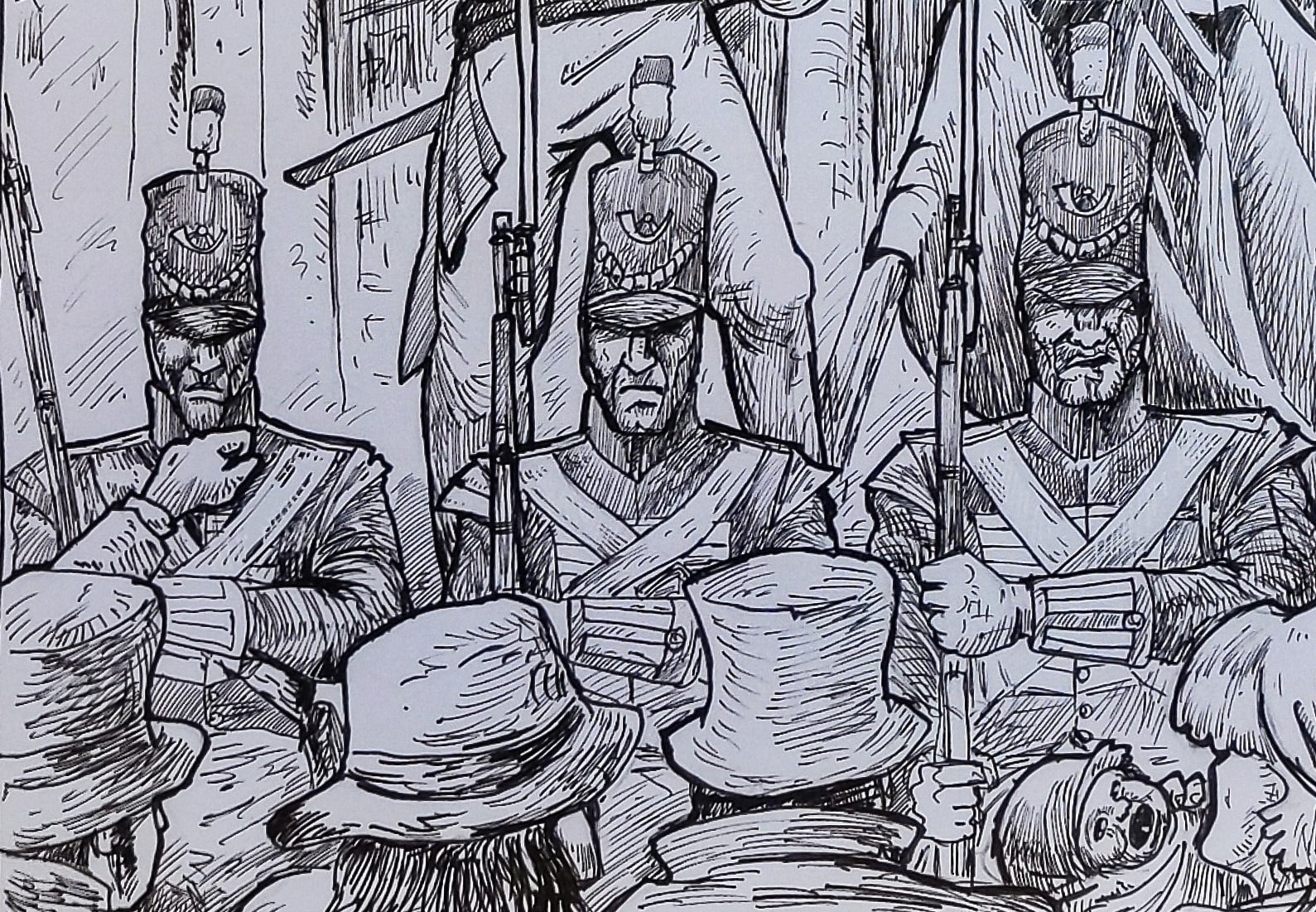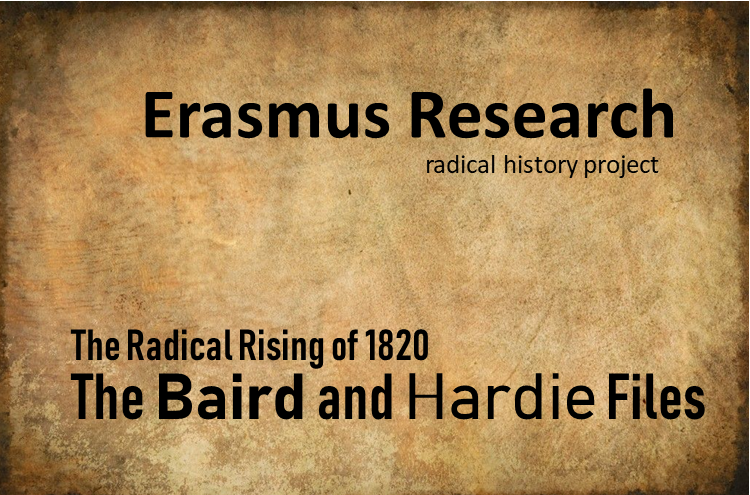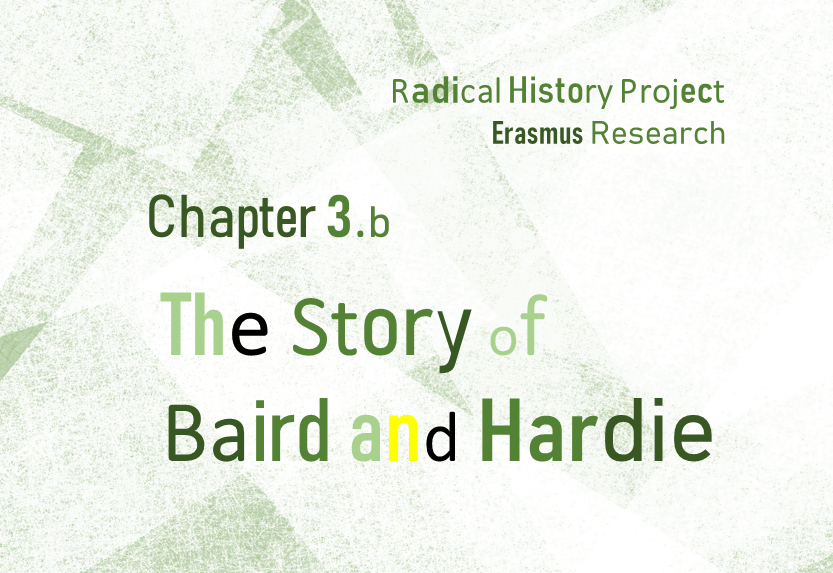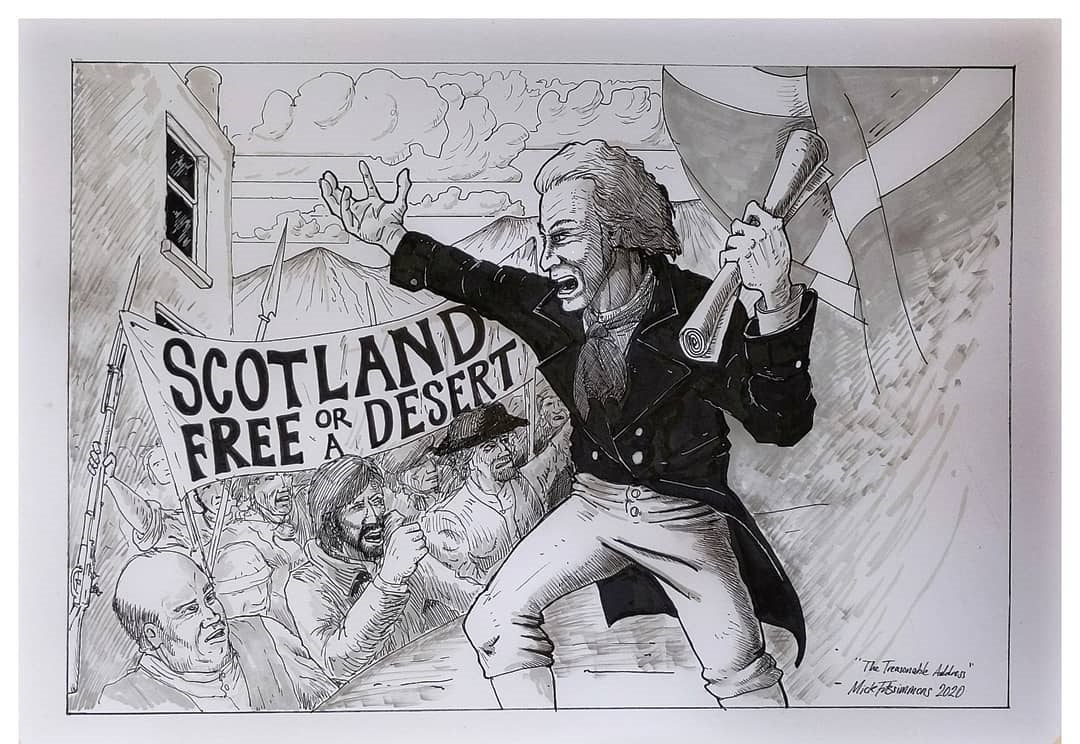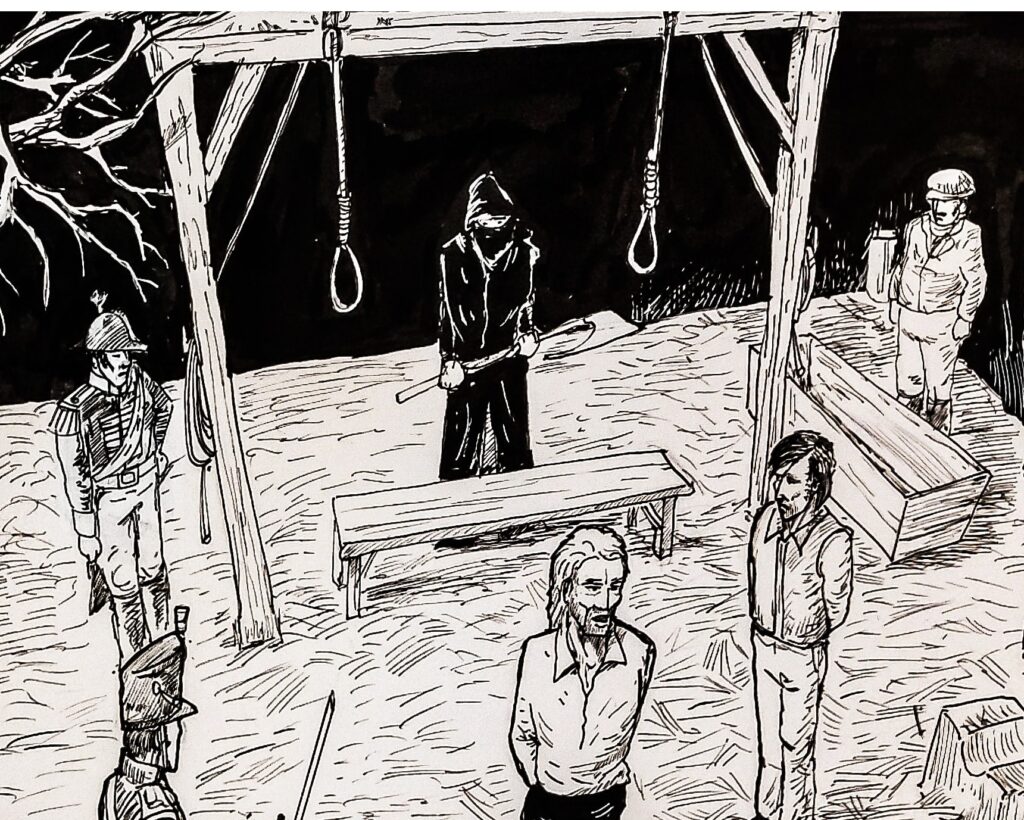
CHAPTER XVI
This is Chapter XVI of the serialisation, the wording reproduced exactly as it appeared in the Stirling Sentinel, on Tuesday 28th May 1889.
Meeting Between Baird and Hardie and the other Bonnymuir Prisoners – Address by Baird – The Last Farewell – Leaving the Castle for the Scaffold – The Masked Headsman – The Crown in Broad Street – The Composure of the Doomed Men – Prepared for Death
About an hour before they quitted the Castle for the scaffold, Baird and Hardie requested that they be permitted to take farewell of the other prisoners who had been condemned to death, but whose sentence had been commuted to transportation for life. They were all brought out from their respective places of confinement and grouped round the window of their unfortunate companions’ cell. The meeting presented a most interesting and mournful spectacle. Almost all were bathed in tears; they took each other by the hand with the greatest warmth, and mutually implored the strength of God upon their fellows, according to their need. In answer to their enquiries, Hardie declared he never was better in his life. The Journal says that before the men were removed, Baird addressed them in a short but affectionate speech. Our other authority has it that both Baird and Hardie addressed their comrades in the most affectionate and endearing, yet in the most dignified style.
Baird reminded them that in little more than an hour he was to be launched into that eternity to which they too had been condemned. God in the riches and sovereignty of his grace had stretched forth his hand to deliver them. This (he said) was a most remarkable event – a distinguished era in their existence – which he trusted would never be forgot, and would never cease to bring forth under God, those fruits of righteousness it was so strikingly calculated to produce. He pressed upon them to cherish more and more those religious sentiments, which the awfulness of their past situation had been the means of kindling within them. On their voyage to the land of their exile, they would, it was probable, be associated with the worst of criminals, with characters of most violent and abandoned principles, but he earnestly hoped they would take no part in their wicked ways, but, on the contrary, make the light of their good example shine before them, that they, if possible, might be brought to glorify their heavenly father. And once aroused, he exhorted them to follow up the same good work, bearing in mind that if their lives had been preserved by God, it must be for some good purpose, it must be because he had something before the close of their days for them yet to accomplish; and in what could they engage more in unison with the gracious designs of his providence, than to endeavour to make known to the ignorant and guilty inhabitants of that distant region the knowledge of these truths which had supported their own minds, and which were the power of God, and the wisdom of God, unto salvation, to those that believe. In conclusion, he commended them to God and the word of his grace, and begged of them when they were again conducted to their cells, instead of giving themselves up to unavailing sorrow, to go to their knees and pray to the Almighty God for strength and support to his unfortunate brother and himself who were to be so soon hurried into the presence of their God. During the time Baird spoke, all listened with the most profound interest, and then the last farewells were spoken, and the solemn and impressive meeting came to an end.
About one o’clock Baird and Hardie left their cells with the utmost composure, which they manifested to the very last – Baird leaning on the Rev. Mr Bruce and Hardie on the Revs. Drs Wright and Small. In this way, after pausing a little at the guardroom, they were conducted to the hurdle, which waited for them without the Castle gate. The hurdle consisted of several planks nailed together, and was drawn along the ground by a white horse, as an eye-witness informs us. At the Castle gate were the Sheriffs and the Magistrates, with their badges of office. The prisoners got on to the hurdle and sat on a seat with their backs to the horse, the headsman, masked, taking a seat opposite to them. Hardie bent forward, looked into his face, then turned round with a smile upon his countenance, and remarked to Mr Bruce that he was looking to see if he knew him, but could not recognise him; he thought him a young man about 20. Mr Bruce remarked what a painful task it was for a young man. “I am not so certain of that,” Hardie remarked, “he seemed to look us stern in the face.” They then, of their own accord, when the procession commenced to move, began to sing the last hymn, which they continued to do with great animation, till they reached the front of the Courthouse, where the gallows were erected.
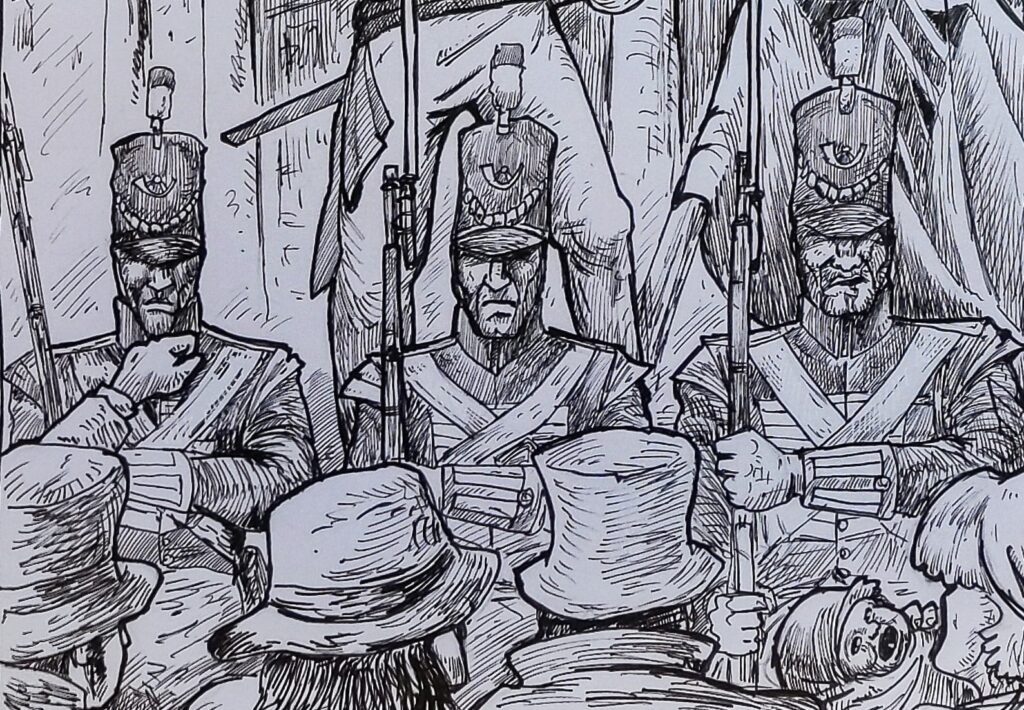
The soldiery, consisting of six companies of the 13th Foot and a troop of the 7th Dragoon Guards, formed three sides of a square in front and each side of the scaffold – the infantry in front supported by the cavalry. Some of the soldiers were dissolved in tear. The shops in Broad Street, Bow Street and St. Mary’s Wynd were shut, but the windows of the houses were crammed with spectators, and it is estimated that no fewer than 6000 persons witnessed the distressing scene. The Radicals of Carronshore and St. Ninians who sympathised strongly with the sufferers, did not venture into the town, but being unable to settle at their work, took a long walk into the country, doubtless lamenting together over the melancholy termination of all their hopes.
About twenty minutes to two o’clock the hurdle halted in front of the scaffold. Hardie immediately arose, placed his right hand on his breast, and lifting his eyes to the scaffold with an air of triumph, exclaimed – “Hail! Harbinger of eternal rest!” He was followed off the hurdle by Baird and afterwards by the masked executioner. Hardie took the arm of Dr Wright, Baird the arms of Dr Small and Mr Bruce. Hardie stepped lightly and firmly up the steps and was, by mistake, led into the waiting-room. He twice bowed respectfully to the gentlemen who were present, and was then conducted into the court-room. After being seated for a while, he turned round to see who were present, and observing that there were but few, he remarked to Mr Bruce as if he expected a crowd, “Is this all that is to be present?” Being asked which psalms they wished read or sung, both the men signified that it was immaterial.
Dr Wright, however, read the whole of the 51st psalm, and then prayed most fervently on behalf of the prisoners. He afterwards read, to be sung, a few verses of the same psalm, commencing with the 7th verse. All who were present, joined with the prisoners singing without the slightest symptoms of agitation. Dr Small then prayed most earnestly with and for them: but on his making some reference to the cause of their unhappy situation, Hardie turned from the table with a look as if he had heard something not in unison with his feelings, and he pressed his elbow against Mr Bruce, as if to make him mark the circumstance. After prayer, Dr Small read a portion of the 130th psalm, which was sung in the same manner, Hardie, as in the former case, giving out two lines at a time.
During the turning out of the garrison, and the other preparations for their removal, Hardie gave out and sung the whole of the 48th paraphrase, in which all joined; he led the tune and read the line with as much ease as if he was the least concerned; after which both he and Dr Small engaged in fervent prayer for strength to support them on high. Hardie was particularly fervent in his petitions, asking that both “he and his companion might have grace cheerfully to resign their lives, and be enabled ever to rejoice that they were counted worthy to suffer in the cause of truth and justice.” This part of the devotions is not recorded by the Journal, whose reporter interjects a couple of sentences which are scarcely consistent with his own account of what preceded or came after. “The calmness evinced by the prisoners while in the court-room,” he writes, “seemed more the result of a mastery over their words and actions than the tranquillity of a mind at rest. It could easily be seen that their manner, observations and looks were forced – not natural – for by the sudden brightening of the eye (these observations apply more particularly to Hardie) at times gazing with vacancy, then by the as sudden, though momentary fatuity of look, one could easily discern that the mastery was sometimes beyond their reach.”
When preparations were made to pinion the prisoners, all who were not in official situations were requested to retire. Hardie then asked for a glass of wine, and on its being presented to him he raised the glass towards his mouth and exclaimed with his eyes raised upwards “A speedy deliverance to my afflicted country!” Then taking the glass from his mouth, he caught the eye of Mr McDonald, the Sheriff, which was sternly bent towards him, and bowing, addressed himself in respectful language to that gentleman in the following words – “My Lord Sheriff, I beg to return you my fervent thanks for the kind and benevolent attention that you have shown to me and my friends, and the humane attention which you paid in gratifying our wishes on all occasions; you will also please to express to General Graham and Major Peddie our sense of gratitude for the humanity and attention which they have always shown us.” He added that he wished well to the town and inhabitants of Stirling. He then drank off the whole contents of the glass. Baird then, bowing, addressed himself to Mr McDonald, expressing similar sentiments towards him and the other gentlemen referred to by Hardie. He drank about a third of his glass of wine, and both he and Hardie ate a small biscuit.
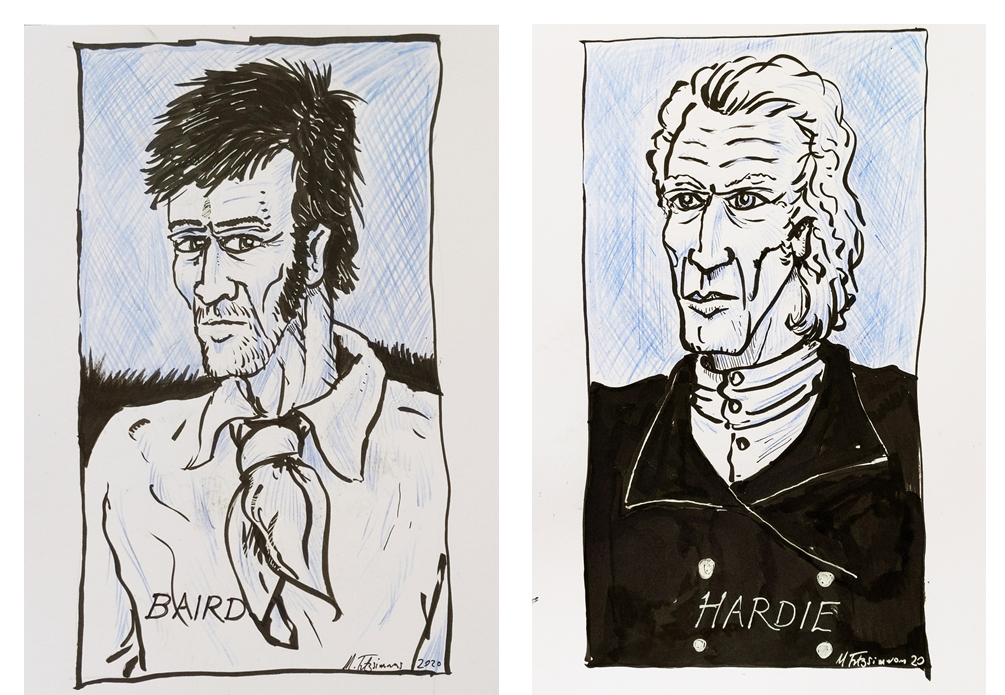
When the executioner (Thomas Young, the Glasgow hangman) came forward for the purpose of pinioning the prisoners, Hardie observed to Mr Bruce, “I know this man well, he was in the same regiment with me;” and on the executioner proceeding to secure him, he held up his hands to heaven and prayed mentally for a few seconds; then regaining his apparent former composure, he spoke familiarly to Young, saying that he would not be tortured, but he acquiesced that duty must be done, and submitted to what was required. When he was pinioned he went to the table and passing the clergyman, said, “Oh, that all were as I am, except these bonds.” Baird, while the executioner was pinioning his companion, whispered to Mr Bruce, “Oh join me in secret prayer to God that my strength may not fail me,” then inclined his head in the attitude of prayer on the table, which position he maintained while he was being bound. Previously to this, when white dresses were offered them, they objected to wear them and their wishes were complied with. When it was stated by a Mr Alex. Calder, of Glasgow, that their coats must be cut up behind to permit the headsman to do his duty, Hardie, with considerable agitation replied, “What, sir, don’t you know I am not to wear any more coats in this world?” Both being pinioned, Hardie spoke to Baird and motioned him to proceed to the scaffold, at the same time offering him the handkerchief intended for the signal to the executioner, but this Baird declined, saying, “You may as well keep it.” It was generally remarked that while in the Court-room both the prisoners appeared less affected with their situation than any other person present; while they held the glasses in their hands, the liquor was never seen to quiver, and notwithstanding the length of time required to sing the two Psalms, during which time Hardie held the book in one hand, not the smallest tremulous motion could be perceived.
To be continued…

